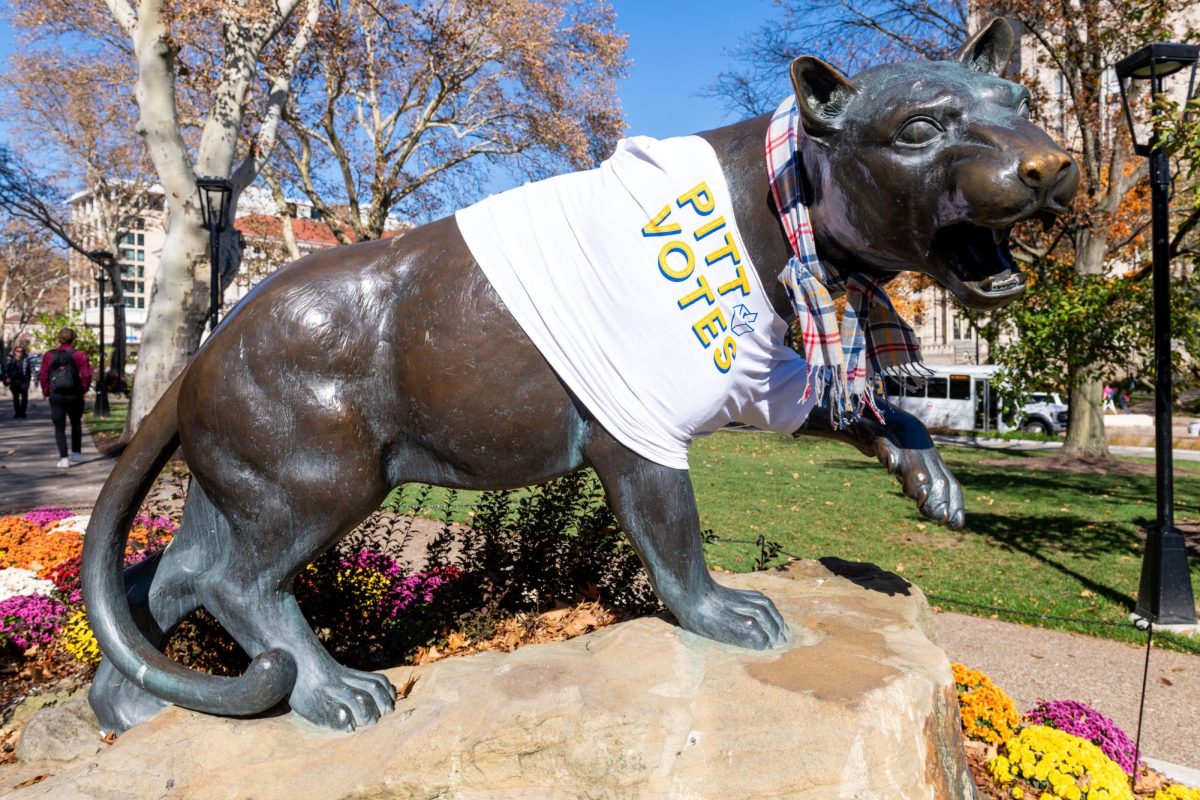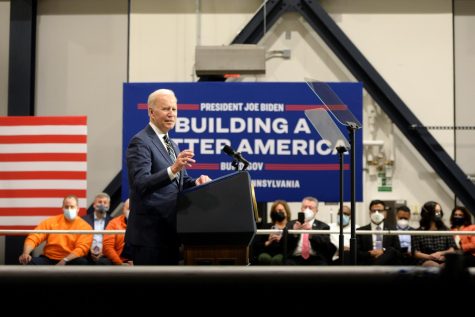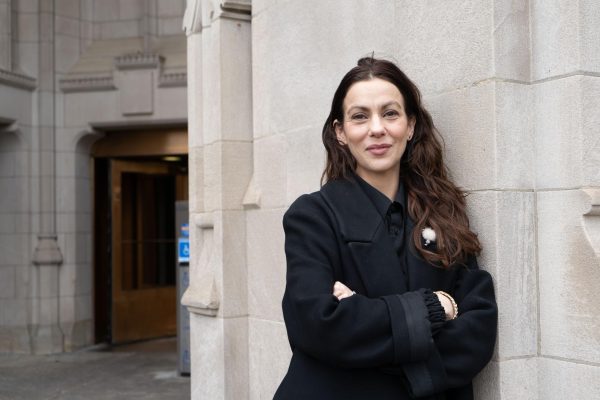Centennial Edition: 1960s
October 28, 2010
Some people remember the ’60s as a time of free love and radical expression. Others struggle… Some people remember the ’60s as a time of free love and radical expression. Others struggle to remember the decade at all.
The people who worked at The Pitt News during the ’60s remember at least one thing — a resident office cat named Feh.
Barry Gross, the news editor from 1962-63, said a cat named Feh called The Pitt News office home, at least for a while.
Named for the sound of disgust one makes when nearing a litter box, Feh was booted out when the cleaning crew decided to rescind his welcome.
Feh was later replaced with a stray Pitt News staff member who left his parents’ house only to move into the office.
“He got a drawer in the filing cabinet,” Gross said. The vagabond crashed on the couch for at least a couple of months. Gross said he was not sure where the stray showered.
Although the atmosphere at the office was light — Gross said the staff “didn’t really hold meetings, and people who wanted to write would drift in — the content of the semiweekly paper reflected tumultuous events that were brewing in the United States.”
In the Nov. 5, 1962, edition of the paper, the news section covered the Student Government’s disapproval of a student protest.
“Student Government unanimously stated their disapproval of the riot that resulted Friday when students picketed against President Kennedy’s stand on Cuba,” The Pitt News reported.
As students became increasingly involved in national politics, The Pitt News made sure to establish campus coverage as its first priority.
Gross said The Pitt News tried to keep its focus on student life.
It was an attempt to cover all of the campus happenings that led Gross to The Pitt News. He accompanied a friend who worked for the newspaper to the fourth floor of the William Pitt Union — then called Schenley Hotel — only to see the news section scrambling to find a reporter to cover a lecture.
“Is that like taking notes in class?” Gross asked.
The news editors told him it was, and he took the job. Since that first assignment, Gross has worked at the Pittsburgh Post-Gazette, The Washington Post and The Philadelphia Inquirer.
Marjorie Nichols’ decision to join The Pitt News was just as spur of the moment.
Nichols — a creative writing major — felt pressured to get a job with the newspaper, although she tried resisting it.
“I didn’t find the writing part of journalism very exciting,” she said.
When she walked to the office floor in 1961, she told the first person she ran into that she wanted to be a writer.
He asked her if she wanted to be a photographer instead.
“My eyes got really big, and I knew that’s what I wanted to do,” she said.
After getting hired, Nichols didn’t get much time to acclimate herself to the life of a photojournalist.
“He put 15 pounds of stuff on me and said, ‘Go get ‘em, Flash,’” Nichols said.
Armed with a Speed Graflex camera, Nichols covered the important events of campus. She said she became the first female photo editor in 1962.
The distinction of forging the path for female photographers didn’t really dawn on Nichols.
“I didn’t think, ‘Oh, I’m a woman becoming a photography editor,’” Nichols said.
Nichols spent 40 hours a week in the office, but when she wasn’t rolling a bottle up and down the hall to dissolve developing chemicals with hot water, she was out photographing the musicians and activists who came to Pitt.
Feminist Betty Friedan and Indian sitar player Ravi Shankar were some of the big names Nichols captured on film.
Gross remembered when Shankar — the ’60s’ trendiest hippie — came to town. It was kind of an inside joke for the writers.
“Oh, Ravi Shankar’s here again,” they’d grumble good-naturedly. Gross said Shankar came to Pitt so frequently he almost became old news.
Gross, who graduated in 1963, said he missed out on the decade’s biggest year for news, 1964. Although Gross remembers covering the controversial topic of adding parking meters to the parking lot in what is now Schenley Plaza, Gross said he missed out on the activism that surrounded the Vietnam War.
The Pitt News reported in the Sept. 13, 1968, edition that every week in Pittsburgh, three men drafted for the Vietnam War did not show up for induction.
“The late President Kennedy once mentioned he hoped that one day the man who resists the draft will be given the same honors as the warrior. The members of the resistance are helping to make this dream a reality,” The Pitt News reported.
Although the nation was embroiled in an unpopular war in the midst of a civil rights movement, there were other things The Pitt News was concerned about, such as the decline of campus sports programs.
Jay Rosenstein, who worked in the sports section of The Pitt News from 1964-68, said he worked during “the worst of times.” During his years at Pitt, the football team went 3-27.
The basketball team wasn’t much better. Fans are now known as the Oakland Zoo, but in the ’60s, a different kind of animal was at the games.
Rosenstein, who was sports editor his final year working for the paper, remembered when a “fan” threw a dead fish onto the court. With only 300 to 500 people attending, the games were a quiet affair, he said.
“If someone was eating popcorn, you could hear them eating popcorn,” he said.
Although Rosenstein didn’t get to cover the best sports team, the experience he received at The Pitt News launched his career into sports journalism, eventually leading to a position at CBS.
Currently, some Pitt students have the habit of destroying their own campus after a big sports win, but in the ’60s, Pitt students were the campus’ valiant protectors.
Rosenstein said when Pitt was preparing to play West Virginia, students appointed patrols in Litchfield Towers to watch out for enemy destruction. West Virginians would sneak onto campus and attempt to vandalize Towers.
Just as students protested for civil rights and gender equality, The Pitt News also covered protests for a better sports program.
The football team caused a ruckus when it protested for a stronger new coach and an improved recruiting system.
The paper demanded in its Jan. 20, 1969, edition that “School must be called off on Pop Warner’s and Jack Sutherland’s birthday.” The two were both football coaches.
The gridders, as they were called back then — Rosenstein said all sports teams were given nicknames like “gridders,” “hoopsters” and “tracksters” because the paper’s style guidelines forbade the use of “Pitt” — bumped up against an unresponsive University.Team members barricaded the Fitzgerald Field House, preventing three or four secretaries from leaving.
“The controversy thickens. The Pittsburgh Police considered storming the building, then remembered that football players are bigger than the ordinary college student. Tear gas was also rejected as a weapon. ‘If they can stand those normal field house smells this long, then tear gas won’t effect [sic] them at all,’ voiced one of the Field House maintenance men,” according to The Pitt News.
Rosenstein said the paper appealed to the University, asking for more funding for the sports program. The University said no.
The Pitt News became increasingly political during the ’60s, demanding that the University give more rights to the students.
In an editorial of the Sept. 9, 1968, edition of The Pitt News, students are compared to serfs.
“The Cathedral represents the prevalent architecture of the Middle Ages. The paternalistic thinking at the University represents an equally archaic theme. Can the University continue to exist with 12th Century attitudes? Or, will the administration erase the puritan comfort of the past and dirty their hands with the hardships of change? We do not know the answers to these questions, but we do know that the students at this University are like 12th century serfs, shackled to the antiquated tenets of an undemocratic University structure in this the Democratic Society [sic]. ”
The chance to write editorials like these, capture photos of protests or cover parking meter scandals made school tolerable for many staff members.
“School was just an excuse to be on The Pitt News,” Nichols said.
Additional headlines include:
Feb. 13, 1961: Women rally against dress code permitting them to wear “slacks or Bermuda shorts” only on Saturdays
Feb. 19 1962: Students join peace rally in Washington, D.C.
Nov. 27, 1963: President’s death halts university events
March 6, 1964: Bomb scare in Langley Hall prompts immediate evacuation
March 17, 1965: Area students bus south for march on the capitol in Alabama against Gov. Wallace’s policies
Nov. 4, 1966:Huge crowd hears King speak
March 22, 1967: Use of marijuana at Pitt reaches dorms and frats
April 5, 1968: The Pitt News issues a special 2-page supplement honoring Martin Luther King, Jr.: The Pitt News dedicates this special supplement to the dream of the late Dr. Martin Luther King, Jr.
Jan. 10 1969: Curfew abolished for Pitt women
Jan. 16, 1969: ‘Pressured’ chancellor complies ‘positively’ with black demands







